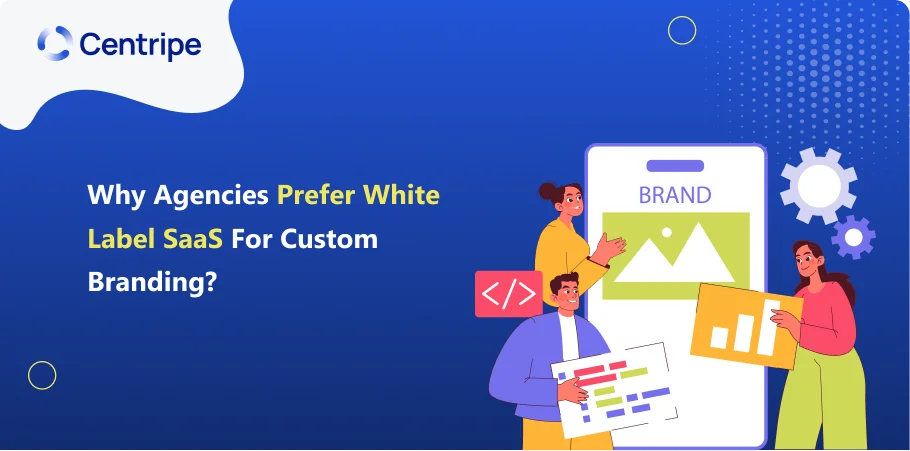Running an agency requires a software solution that looks and feels like your own without spending years developing it. This is where white-label SaaS customization steps in. It’s a practical way for agencies to rebrand existing software and offer it to clients as if it’s their creation.
White label SaaS customization saves time and resources and allows agencies to align the software with their brand identity. By customizing the logo, colors, and interface, agencies deliver a seamless experience to clients. This builds trust, strengthens relationships, and gives clients the confidence that the solution is tailored specifically for them.
With white-label SaaS, agencies can focus on what they do best, serving clients without the hassle of building software from scratch. Let us walk you through how:
Why Enterprise Marketing Automation Matters
White label SaaS customization involves modifying a pre-built software platform to align with a company’s branding and specific needs. This includes adding logos, adjusting color schemes, customizing features, and integrating tools, enabling businesses to offer the solution as their own product.
Why White Label SaaS Customization Matters?
Customization allows agencies to stand out in a competitive market. By rebranding the software with logos, colors, and domains, agencies create a cohesive experience that clients can trust. This strengthens relationships and improves brand loyalty.
Another reason white label SaaS customization matters is scalability. A white label CRM reseller can cater to different client needs without reinventing the wheel. Agencies can adapt to growing demands, all while maintaining their unique identity using customizable SaaS platforms.
Key Considerations for White-Label CRM Customization
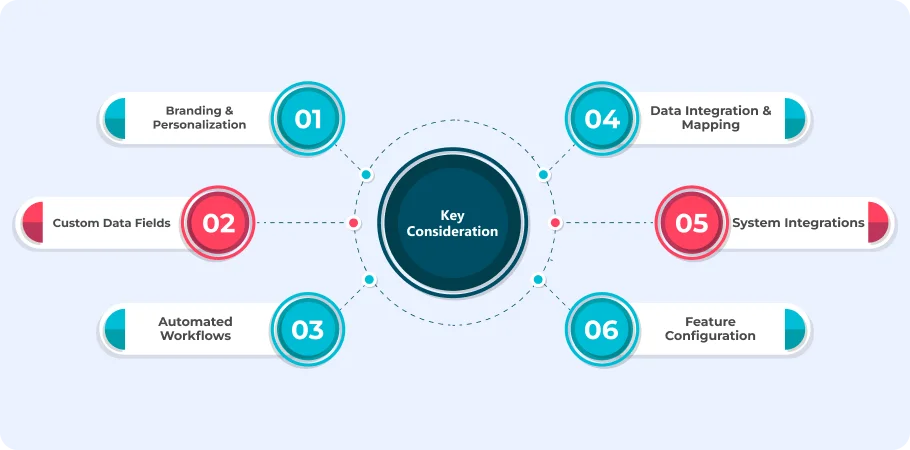
Things to Know About Mortgage CRM Software Development Cost
1. Branding and Personalization
Adjust the platform’s colors, replace the logo with your own, and tailor the user interface to match your company’s identity.
This Strengthens your brand recognition and ensures a cohesive, professional experience for users.
2. Custom Data Fields
Add or remove fields and rename them to align with your specific sales processes and terminology.
This Makes the platform intuitive and fully tailored to your business operations, improving data accuracy.
3. Automated Workflows
Automate repetitive tasks and create triggers for specific stages in the sales pipeline to simplify processes.
This will Saves time, reduces manual errors, and ensures smoother and more consistent operations.
4. Data Integration and Mapping
Map CRM data fields with your existing systems and configure data imports and exports to fit your workflow.
It Ensures seamless data integration, enhancing operational efficiency and decision-making.
5. System Integrations
Integrate the CRM with essential tools like email, calendars, and marketing platforms for a unified ecosystem.
Boosts productivity by creating smooth data flow and improving team collaboration.
6. Feature Configuration
Enable or disable features and adjust functionalities to align with your business goals.
Maximizes efficiency by providing a solution customized to your exact requirements.
Benefits of White Label SaaS
white label SaaS software customization offers several advantages for agencies and businesses, allowing them to take their services to new levels and solidify their market positions while leaving the variation of software development behind.
1. Quicker Market Launch:
This type of SaaS allows companies to create software with their own branding significantly faster than it would take them to develop a program from scratch. This allows companies to fulfill customers’ needs and expectations and avoid competitor threats.
2. Cost Savings:
Building software from scratch requires significant financial investment, including technology, skilled developers, and ongoing maintenance. White-label SaaS eliminates these expenses, providing ready-to-use solutions that reduce overhead.
3. Adapatable for Growth:
These platforms aim to grow seamlessly. From interacting with one or two clients to expanding to serve clients across the world, none of these challenges is a challenge to white-label SaaS.
4. Tailored Branding:
Most white-label SaaS platforms provided to companies enable the business to incorporate its logo, color, and other qualities into the white label services and software. This helps present a rational and integrated view of the business’s various products to clients.
5. Focus on Core Activities:
When choosing an outsourcing model for software development and management, businesses can effectively focus on their major specialties, such as marketing, sales, and developing new prospects, leaving the technical issues to the SaaS provider.
6. Reliable Technology:
White-label SaaS platforms usually have to be designed and improved by competent dealers in the market. This allows businesses to provide standard products that are generally good for use and have been tested for strength.
7. New Revenue Opportunities:
Having white-label SaaS to offer means you can generate extra profits not present in any other such service offerings. Companies can resell the software with new looks, exploit new markets, and typically make subscription revenue by offering different usage rights.
8. Business-Specific:
White-Label SaaS as a Solution for Companies Growth without Development Overhead. It’s an efficient way to provide top-tier services while focusing on what truly matters.
Why Agencies Prefer White Label Custom Branding
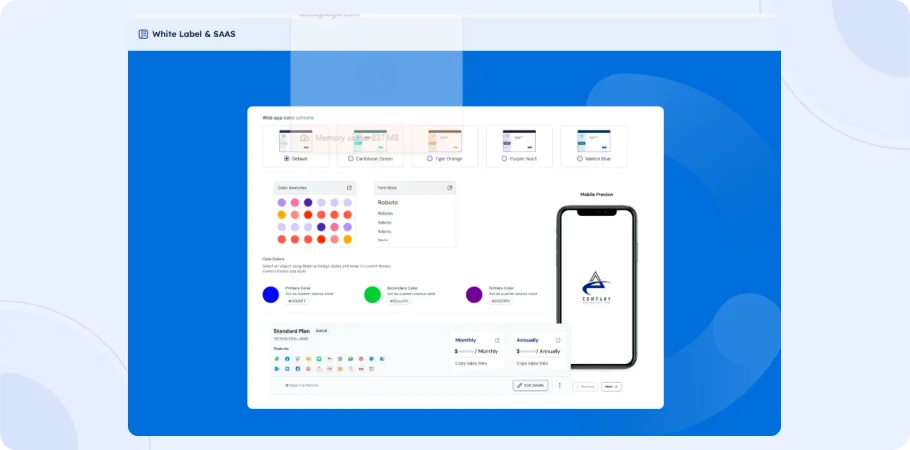
Agencies are turning to custom branding software solutions to deliver tailored solutions that align seamlessly with their brand identity.
This approach allows agencies to offer software solutions as their own, strengthening client relationships and enhancing their value in the market.
Let’s walk you through why agencies prioritize custom and branding elements in white-label SaaS.
1. Brand Consistency:
White-label SaaS enables agencies to fully customize software with their logos, color schemes, and domain names.
This ensures a cohesive brand experience across all platforms, making it easier to maintain brand integrity and create a professional impression for clients.
2. Client Perception:
Agencies develop loyalty and trust in their clients when they showcase software that belongs to them alone. This approach makes the clients feel that they are being served with a product/good developed for their unique needs, which retains them as clients in the long run.
3. Market Differentiation:
Custom branding helps agencies stand out from competitors by delivering unique software experiences. A tailored solution reflecting the agency’s brand identity allows it to position itself as innovative and client-focused.
4. Increased Value Proposition:
When agencies add their branding and customizations to white-label software, they transform it into a higher-value service.
This added personalization justifies premium pricing and emphasizes their expertise and commitment to client needs.
Use cases of White Label SaaS Customization
White label SaaS solutions allow businesses and agencies to rebrand and resell software tailored to various industries.
These platforms save time, revenue streams reduce costs, and empower businesses to deliver high-quality tools while maintaining their branding. Below are key use cases to inspire your next project.
1. Social Media Management:
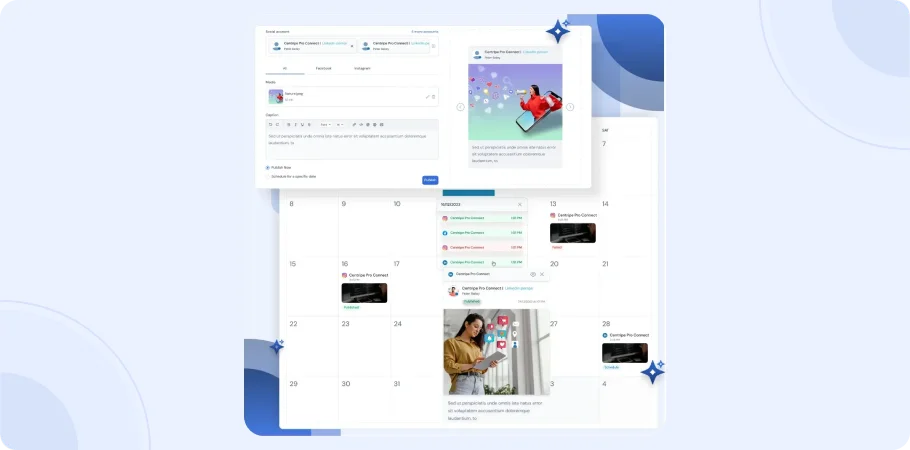
White label social media management software tools offer businesses a complete solution for managing their online presence. Users can schedule, post, and monitor content across platforms while tracking key metrics like engagement and reach.
These tools make it easy to improve campaign performance without developing in-house software.
By rebranding these systems, agencies can provide clients with seamless and customizable solutions for managing social media campaigns.
The ability to analyze performance ensures clients achieve better results, making it a valuable addition to their service portfolio.
2. Email Marketing
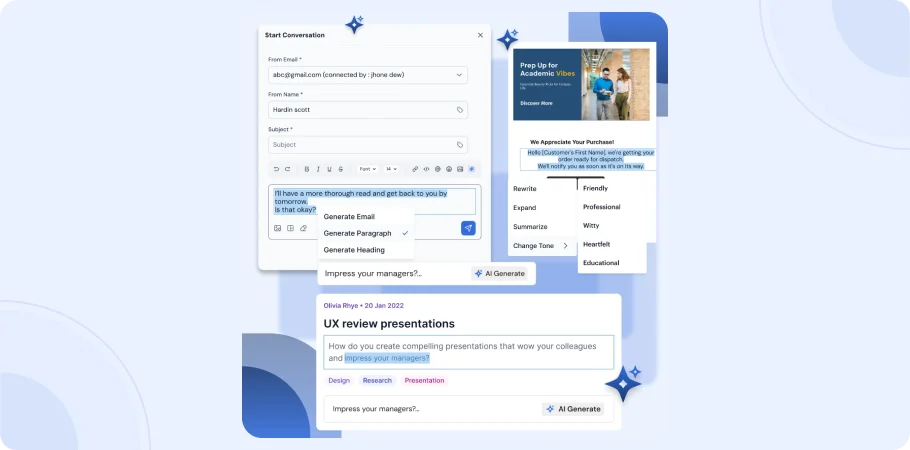
White label email marketing software makes creating and managing useful email campaigns easy. It integrates features such as drag-and-drop email editors, list segregation, and performance reports.
Some top marketing agencies can offer clients solutions for professional campaigns without gimmicks and technicalities.
Businesses can offer branded email solutions that enhance communication and drive conversions by customizing these tools.
Automated sequences and detailed reporting make it easier for clients to engage their audience and achieve measurable outcomes.
3. Website Creation
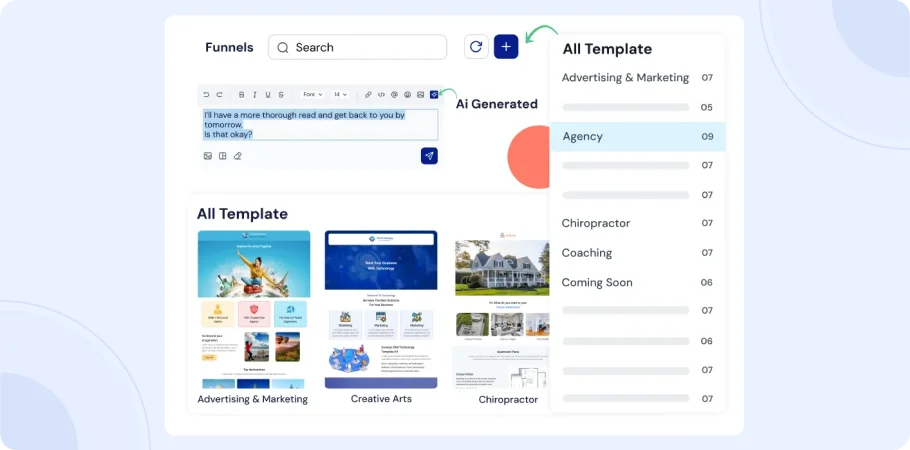
White-label website builders save time in creating professional and responsive websites for businesses. Web design tools, including site builders, can provide drag-and-drop interfaces, templates for easy development, and capabilities for Search Engine Optimization, e-commerce, and analytics.
This eliminates the need for advanced coding skills, making website creation accessible.
4. Chatbot Building
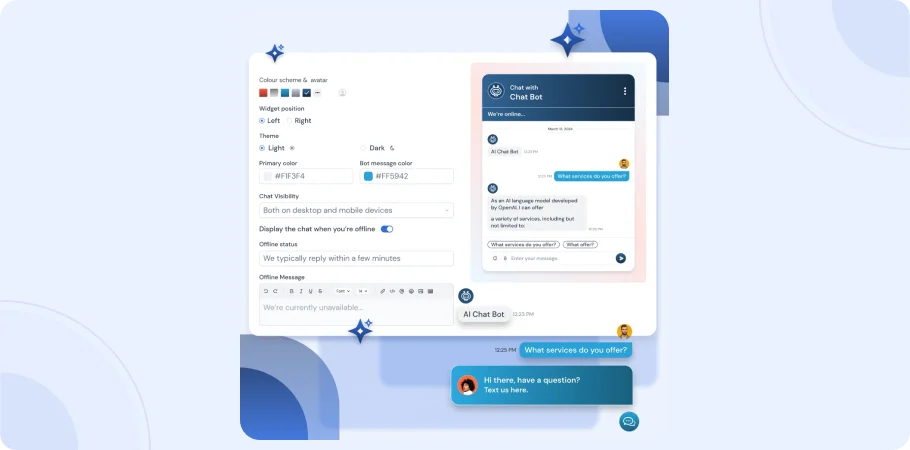
White-label chatbot services enable clients to develop AI-based bots that can answer clients’ questions and capture new leads.
These tools include customizable conversation flows, automated responses, and integrations with popular messaging apps. Businesses can provide round-the-clock support without extra staffing costs.
By rebranding these solutions, agencies can offer clients great customer engagement tools. The ability to design personalized chatbot experiences helps businesses enhance support and customer satisfaction and automate repetitive tasks effectively.
5. Marketing Automation
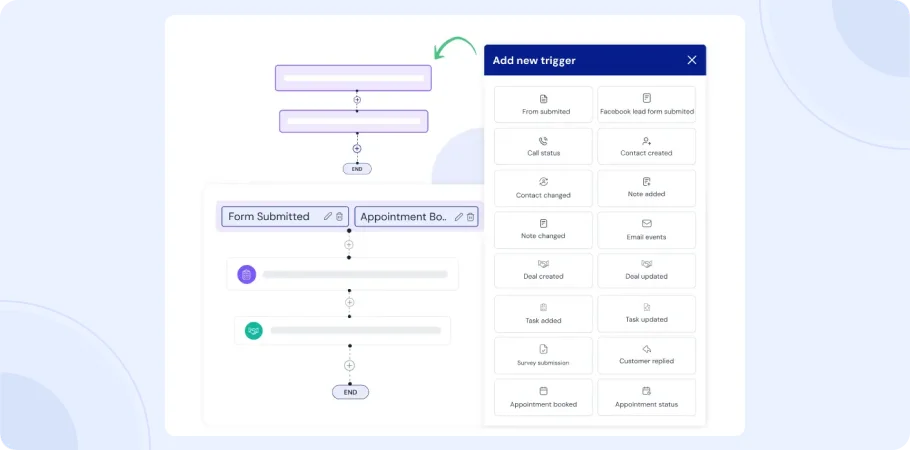
White label marketing automation platforms streamline complex marketing tasks like lead nurturing, segmentation, and campaign tracking.
They allow businesses to save time on those tasks and provide one-to-one custom marketing experiences.
Customer insights can be gained through the cross-channel analysis of customer behavior.
Agencies can leverage these solutions to do customer relationship management offer branded marketing services that boost efficiency and ROI.
These platforms help clients scale their marketing efforts by simplifying workflows and improving targeting.
6. Client Reporting Dashboards
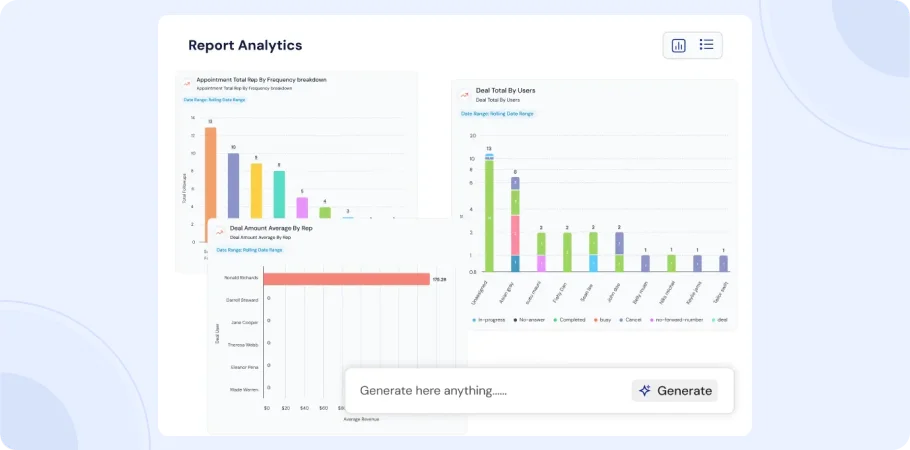
Agencies can use white-label reporting tools to create branded dashboards for clients to monitor key metrics, performance, and campaign results.
Customizable reports that display real-time data across various campaigns (e.g., social media, email marketing) allow clients to track ROI and other key KPIs.
This customization ensures that each agency has a reporting solution that aligns with their client’s specific needs and brand aesthetics.
It adds value by offering an easy-to-understand, branded reporting system that helps businesses stay informed and make data-driven decisions.
Scale Faster with Custom-Branded SaaS, No Coding Needed!
How Agencies Get Started with SaaS Customization?
Agencies eager to launch their white-label SaaS offerings can easily get started with Centripe, a platform designed for seamless customization.
It empowers agencies to rebrand and deploy high-quality SaaS solutions with minimal technical effort, enabling them to scale their services while maintaining their unique brand identity.
Below are key features of centripe white label saas customization.
1. Complete Re-branding Capabilities
Agencies can white label the platform with their logos, themes, and domain names, giving the appearance of being their own software. This creates branding authority and ensures your clients see the product as something special and valuable.
ItStrengthens the agency’s brand identity by presenting a unified and professional image to clients.
ThisEnhances client trust and loyalty as they perceive the platform as a unique, proprietary solution tailored to their needs.
2. Accounts Analytics
Track crucial performance metrics for each client account in real time, providing a quick and comprehensive performance overview.
It Allows agencies to make data-driven decisions quickly, ensuring campaigns remain on track and objectives are met.
This Enables proactive performance management, identifying trends or issues before they impact client satisfaction.
3. Centralized and Secure Master Login
Streamline account management with a secure one-click login process, eliminating the hassle of managing multiple passwords for client accounts.
Reduces the time spent on accessing individual accounts, improving operational efficiency for account managers.
Enhances security with centralized access, reducing risks associated with password mismanagement.
4. Unified Billing Profile
Simplify financial operations by consolidating all client accounts under a single billing profile, reducing administrative overhead.
It Minimizes the complexity of managing multiple invoices, allowing teams to focus on core business activities.
Also, Provides a clear financial overview, making budgeting and forecasting more straightforward for agencies.
5. Scalable Client Management
Agencies can effortlessly expand their client portfolio with Centripe’s scalable solutions. The platform enables bulk account purchases at discounted rates, providing a cost-effective way to onboard new clients.
Additionally, existing accounts can be seamlessly imported directly into the platform, streamlining the integration process.
These features support rapid agency growth by simplifying client onboarding, allowing agencies to focus on delivering value.
By offering cost savings on account purchases, the platform helps maximize profitability while scaling operations efficiently.
6. Drag-and-Drop Customization
Agencies can use Centripe built-in drag-and-drop editor to personalize layouts, workflows, and dashboards, allowing them to tailor the software to suit the unique needs of each client.
Centripe’s white label SaaS customization makes it easier for agencies to deliver exceptional, branded services while saving time and resources.
Whether launching new marketing solutions or streamlining customer engagement, it provides all the tools needed to help agencies succeed.
7. Custom Client Access Management
Create login credentials with customizable permissions to enable co-management, giving clients tailored access to their accounts.
It improves collaboration with clients by providing controlled access based on their specific needs.
8. Automated and Personalized Client Reporting
Generate detailed, client-specific performance reports to share account insights and maintain transparency in campaign performance.
This Saves time for account managers by automating the reporting process, allowing more focus on strategy.
Also Improves client satisfaction with regular, professional, and easy-to-understand performance insights.
Conclusion
White label SaaS customization offers agencies a smart way to deliver high-quality software solutions that feel uniquely theirs. By rebranding and customizing existing software, agencies save time, cut costs, and build stronger client relationships.
Tools like Centripe enhance this process by providing strong customization options and advanced features like AI-powered analytics. This ensures agencies can offer meaningful, scalable solutions that meet client needs and grow with their business.
FAQs
1. What is white label SaaS?
White label SaaS refers to software developed by one company that another company can rebrand and resell as its own. This allows businesses to offer ready-made solutions without developing software from scratch.
2. What are the benefits of using white label SaaS?
Benefits include quicker market launch, cost savings, scalability, tailored branding, focus on core activities, reliable technology, and many new revenue streams and opportunities.
3. What challenges might agencies face with white label SaaS?
Challenges include limited customization options, dependence on providers for updates and support, and the risk of outdated software if the provider doesn’t keep up with technological advancements.
4. How can agencies ensure the successful implementation of white label SaaS?
To ensure successful implementation, agencies should focus on core needs, embrace change, empower a dedicated team, establish a common language, and plan and rehearse go-live support.
5. Is white-labeling SaaS a profitable business model?
Yes, white-labeling SaaS is profitable as it allows businesses to offer pre-built, customizable solutions under their brand without the high costs of development. It provides recurring revenue opportunities, enhances brand value, and enables quick market entry, making it a cost-effective and scalable business model.
